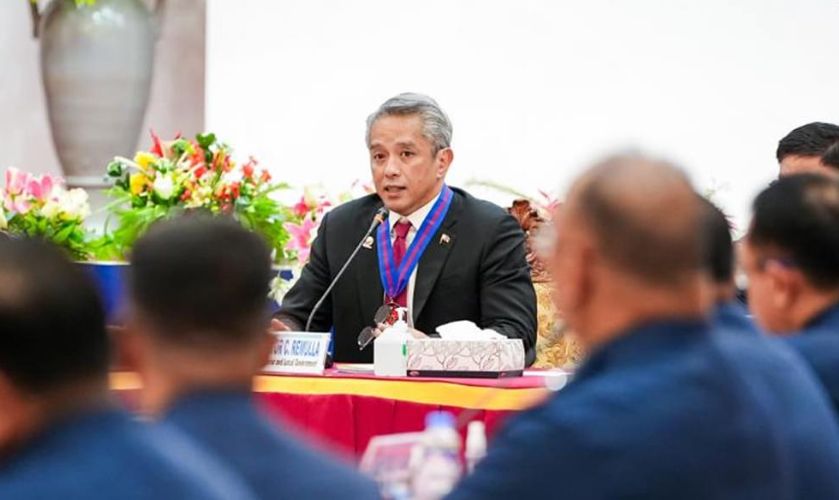Remulla: Entry of 6 weather disturbances in less than one month is the 'new normal'
By Chito Chavez

The entry of six weather disturbances in just a span of less than one month is something that Filipinos should accept as new normal, Department of the Interior and Local Government (DILG) Secretary Juanito “Jonvic’’ Remulla said on Tuesday, Nov. 12.
Tropical storm "Kristine" devastated Bicol region and other parts of Luzon and the Visayas and this was followed by the onslaught of tropical storms "Leon", "Marce" and "Nika".
Weather experts said the tropical storms "Ofel" and "Pepito" will hit the country this week.
“This has never happened before but I think moving forward we should consider it as the new normal,’’ Remulla noted in his Facebook post.
Remulla said the entry of these weather disturbances calls for concerted efforts of the various government agencies.
Currenlty, he said 200,000 relief packs, heavy equipment for rescue operations, mandatory evacuation in high-risk typhoon areas and all first responders are prepared and on standby.
Remulla assured that President Ferdinand “Bongbong’’ Marcos Jr. is on top of the situation and is up to the task of leading the concerned government agencies in providing the appropriate assistance to the typhoon-stricken areas in the country.
“Let’s pray for our brethren up north (typhoon hit regions). Kailangan po nila ang lahat ng ating suporta at dasal (They need our support and prayers),’’ Remulla pointed out.
The DILG also reiterated its call for the public to adhere to its “Operation Listo’’ protocols to ensure their safety in times of disasters and tropical cyclone wind signals (TCWS) that are hoisted in the Philippine area of responsibility (PAR).
Before any weather disturbance occurs, the DILG asked the public to be informed on the latest advisories or updates, check any part of the house that needs repairs, prepare the “E-balde or Go Bag’’ that contain the basic and important needs and relocate animal pets to safer grounds if there are any.
At the height of the typhoon, the DILG told the affected residents to remain calm, stay indoors in their residence or evacuation centers and to listen to the latest updates on the prevailing weather conditions.
During these hours, the DILG said that the electric main switch and water valves in their residences should be turned off
With the electric power supply turned off, the DILG advised the affected residents to use flashlights or emergency lamps and to be extra careful when opting to utilize candles or kerosine lamps and to avoid staying near glass windows.
When the weather improves, the DILG said that those relocated in the evacuation centers should wait for public advisories to determine if it is safe to return to their houses, avoid toppled trees, damaged structures and electric wire connections and if possible, avoid public places so as not to obstruct or hamper the government and volunteer emergency response services to the affected areas.
Upon their return, the DILG also reminded the public to be cautious when repairing their damaged residences and to watch out for wet outlets and electrical appliances and ensure that they are dry before turning the main switch on.
To prevent dengue and spread of communicable diseases, the DILG asked the public to discard the collected water in tin cans, plant pots and old tires.
The DILG also maintained that the primary duties of the barangays in disaster resilience include the establishment and operationalization of the Barangay Risk Reduction Management Committees, the development of barangay disaster risk reduction and management plans, and the allocation of funds for disaster response and recovery.
To increase local government units’ (LGUs’) capacity, the DILG will persist in the implementation of Operation LISTO, its flagship disaster preparedness advocacy program cascaded to the barangay level through the Listo si Kap!, a checklist of proactive actions taken as preparatory and necessary measures based on the manual of higher LGUs and the disaster preparedness minimum standards.
The DILG had conducted assessment activities to gauge the performance of local government units (LGUs), including the barangays, in Disaster Risk Reduction and Management-Climate Change Adaptation (DRRM-CCA) in order to ensure that gaps are addressed and good practices are replicated.
To recall, the DILG also emphasized the crucial role the barangays played in epitomizing the resilience of Filipinos during the height of the Covid-19 pandemic when they became the first line of defense in the communities against the virus and had to serve their constituents and address the situation with their available resources and manpower.